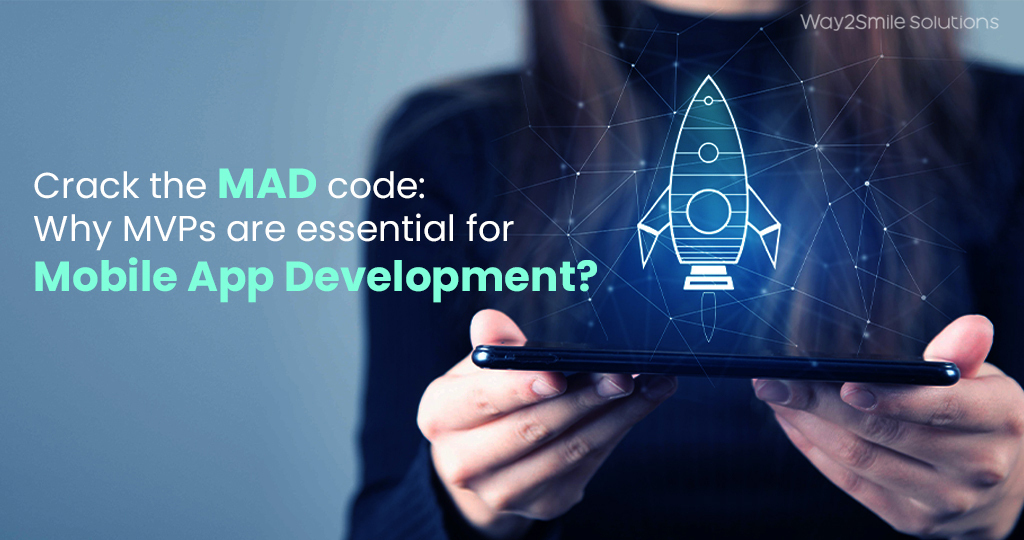Most businesses and enterprises wonder whether MVP app development is right for them. Before we provide an answer for that, we have a question for you – what do Facebook, Uber, and Amazon have in common? If you guessed it right, they started as a Minimum Viable Product (MVP). Surprising, right? Given their growth and market value, they are truly an inspiration to many entrepreneurs who are planning to build a Minimum Viable Product. Before they were giants in their respective industries, they focused on solving specific problems. For starters, Uber helped users pay for taxi fares using credit cards, Facebook was just meant to connect Harvard students, and Amazon sold books. Before they went full scale, they tried and tested the basic features, which enabled them to develop core functionalities to solve a specific problem and satisfy early adopters.
This not only saved them time and money but provided them with the opportunity to learn more about their respective markets and the potential they hold before going full scale. So, if you are venturing into the world of mobile app development trends, a minimum viable product can help you in validating your idea for a mobile application/product. Most importantly, it will provide you with the direction as to which app features should be included to achieve the primary objective. If you are just starting out in the field of mobile application development, this post is going to help you learn a lot about minimum viable products, its role in app development, and who should go for a minimum viable app development agency. So, without further ado, let’s get started.
What is a Minimum Viable Product?
Before we get into the details, it is important to understand what a minimum viable product is. An MVP is a minimal form of a product that is tested on the market for validity. This mobile development trends 2023 strategy used by many of the mobile application development companies that allows them to validate or invalidate product assumptions and identify how the targeted customer base experiences and reacts to your product’s core functionality. This is an important approach before you release the product to the market as it provides a much-needed insight into your budget allocation. Building a minimum viable product is an iterative process that determines the appropriate product functionality and identifies user pain points.
In mobile application development services, building an MVP is a strategy where you just develop the core functionalities of the product to see whether or not it solves the problem and pleases the early adopters. Typically, a minimum viable product is a prototype or just the basic model of the actual product that you develop to test if it can fulfill the primary objective you want to achieve. Unlike other app development processes, MVP app development follows a build-measure-learn approach where you can launch a product but can gradually improve on it as you validate or invalidate the users’ assumptions, build future iterations, and learn what users actually want. Take Facebook as an example. It was launched just to connect Harvard students.
Today, you can sell anything on Facebook. How cool is that? So, building an MVP is a gradual process to app development where you continuously work on improvements, adding new features, deleting the old ones, changing the UI and UX, and a lot more.
Why Startups Need Minimum Viable Products for Mobile App Development?
If you are a startup with a slot for a mobile app trends 2023 for your products or services in the future, you probably know that in order to build an outstanding mobile app, that with top-notch features, is not as easy as you think it is. There are considerations that go into play to achieve this milestone. Nevertheless, not all of them will be a success. As an entrepreneur, there are several questions that may haunt you in your dreams. To start with:
- Will the idea work?
- Will it hit the market?
- Will it satisfy customers’ needs?
We are sure that you are in this kind of situation all the time if you own a startup. But the main question is – were you able to find the right outcome while executing your idea the way you have always wanted? Well, if the answer is NO, then you should not wait and opt for an MVP. It will not only boost your ROI but will also solve all your queries. Mobile app development is a huge investment, and most mobile app development company in Dubai suggest that they should have a proper plan in place before deciding to launch a mobile app.
From hiring a mobile app developer, content writer, graphic designer and to brainstorming ideas and setting up the marketing team, it takes a lot of effort, time, and money to launch a mobile app successfully. If you want to skip all the hassle and validate your idea, MVP is the most effective concept that you should pursue. MVP is the savior for all brand-new startups. As you already know, it is nothing but an early product release to test the waters. But why is MVP a need for startups? Let’s find out.
#1 Reduced Cost of Development
MVP app development allows you to evaluate whether the mobile app functions just the way you want it to. If you go for full-fledged mobile app development with feature-rich functionalities, it is going to cost you a fortune. With the MVP concept, your mobile app will only have essential features that will require fewer resources to develop. The best part is that it can be developed over a shorter period of time.
#2 Develop an Enhanced Version App
Most of the mvp app development company methodology enables you to assess the advantages and disadvantages of the application along with the target audience’s instant responses. It concludes whether the mobile app succeeds in grabbing the attention of the users or not. If not, you can always redesign the app in iterations and deliver its improved version without compromising your budget.
#3 Encounter Security Issues in a Better Way
This is especially paramount when you are incorporating a payment gateway in the mobile app. MVP methodology lets you detect any security loopholes and correct them the right way at the right time.
What role does the MVP play in the growth of startups?
Understanding whether customers actually need or want the product is the mobile app development mvp’s main advantage. Customers' interest can be attracted even before the product is fully developed. A quicker ability to determine whether a product will appeal to customers reduces the risk of wasting money and time developing something that will ultimately fail. Having said that, an MVP will promote efficiency and bring attention to the product's value proposition without serving as the finished good.
Validation
MVPs should convince users that they fix issues, or have features that allow them to do so. Field-testing will occur rapidly and early, but it is not yet something that can be sold on the real market in which it is being developed. In the case of startups, these are often made based on assumptions and leaps of faith. Each one must be rigorously scrutinized for validity. Testing some or all of these hypotheses with the MVP app development can lead to a more robust business model at the same time.
Iteration process
Every iteration, no matter what level, is an enabler. A waterfall management style limits how much feedback and understanding a product development team can gather from the user base. In the sense, however they are not means to an end. Product experiences are incomplete when features are jumped from feature to feature in a flimsy state. The customer will not be able to persist. In spite of that, the product must function properly.
Customer feedback
A product-market fit can be determined as early as possible based on feedback gathered. The product development team can then release useful features to meet the needs of customers in the right way. Team members may mistakenly take every comment as granted, ignoring the actual market signals. Instead of focusing on product-market fit, this leads to solving singular customer problems. Not as a single point of actionable data, but as a batch of market signals extracted from customer feedback.
Potential to be first to market
An minimum viable app development consultant provide the startup with an advantage over its competitors if it enters the market first. Market dominance can be advantageous to them. It can also be harmful, particularly when potential customers are unaware of the benefits of the product or if it is highly disruptive or innovative. In addition, as consumers become more informed about the type of product and its value, as well as as the market matures, competition will prevail unless the ideal solution is offered to address the issue.
Growth scale
In its early stages, the market is quite understanding of a small startup. Any error may only appear as a minor blip in the road. Less apology is required when something goes wrong what with fewer customers. When it's time to grow, the facts are different. Growing businesses find it very simple to stray off course and very challenging to right the ship. That is to be expected given how much more challenging it is to manage both people and products. Customers have changed the field twice as they have transitioned from visionaries to early enthusiasts to mainstream. Nevertheless, the product must be dependable and durable if it is to be appealing to mainstream customers. There will be no more "Minimum". At this point, in order for something to be considered "viable," it must be completely marketable, taking competition into account. The chances of sustainable, long-term growth become progressively slimmer in the unlikely event that not all elements of a fantastic customer experience are taken into account.
Manageable investment
A manageable investment has a decidedly counterintuitive quality. The risk of failure for startups is actually decreased when less time and money are allocated for learning and adapting to market demands. And starting with an MVP is intended to achieve just that. In spite of the first assumption that a small investment would not produce a product which would solve customers' problems adequately, statistics suggest otherwise. Less money helps the project become more focused. People will naturally simplify their demands, set clear goals, and accept that they can't have everything they want if they are mindful of their spending and try to make do with what they have. It is a waste of investment funds to have the resources to establish sizable departments for marketing, sales, and customer service before knowing why and how one needs them. Doing so will render them inert or trap them in the proverbial "spiral of death." There is an intriguing idea known as MVIF. It means Minimum Viable Investment Framework. It ought to be able to explain why less funding is preferable to more.
Conclusion
There are many billion-dollar companies that have achieved success with MVPs. You must have come across apps like Facebook, Amazon, Uber, Snapchat, Instagram, etc. They all followed the MVP approach before becoming the giants. So, as a startup, MVP App Development company in Dubai should be your first priority rather than spending all your resources and money on building a full-fledged app.
Frequently Asked Questions
- As long as its value is high enough, it will be used or purchased by people.
- Early adopters will be retained if it demonstrates sufficient future benefits.
- As a result, future development will be guided by feedback loops.
- Determine who you want to reach.
- Discover their biggest concerns.
- Identify the problems your product will solve.
- Get to know how customers are resolving these issues right now.
- Identify your direct competitors
- Define killer features.
- Minimum - The most rudimentary skeleton-like foundation of the proposed solution.
- Viable - Sufficient in itself for early adopters.
- Product - Something tangible that a user can see, touch, or feel







